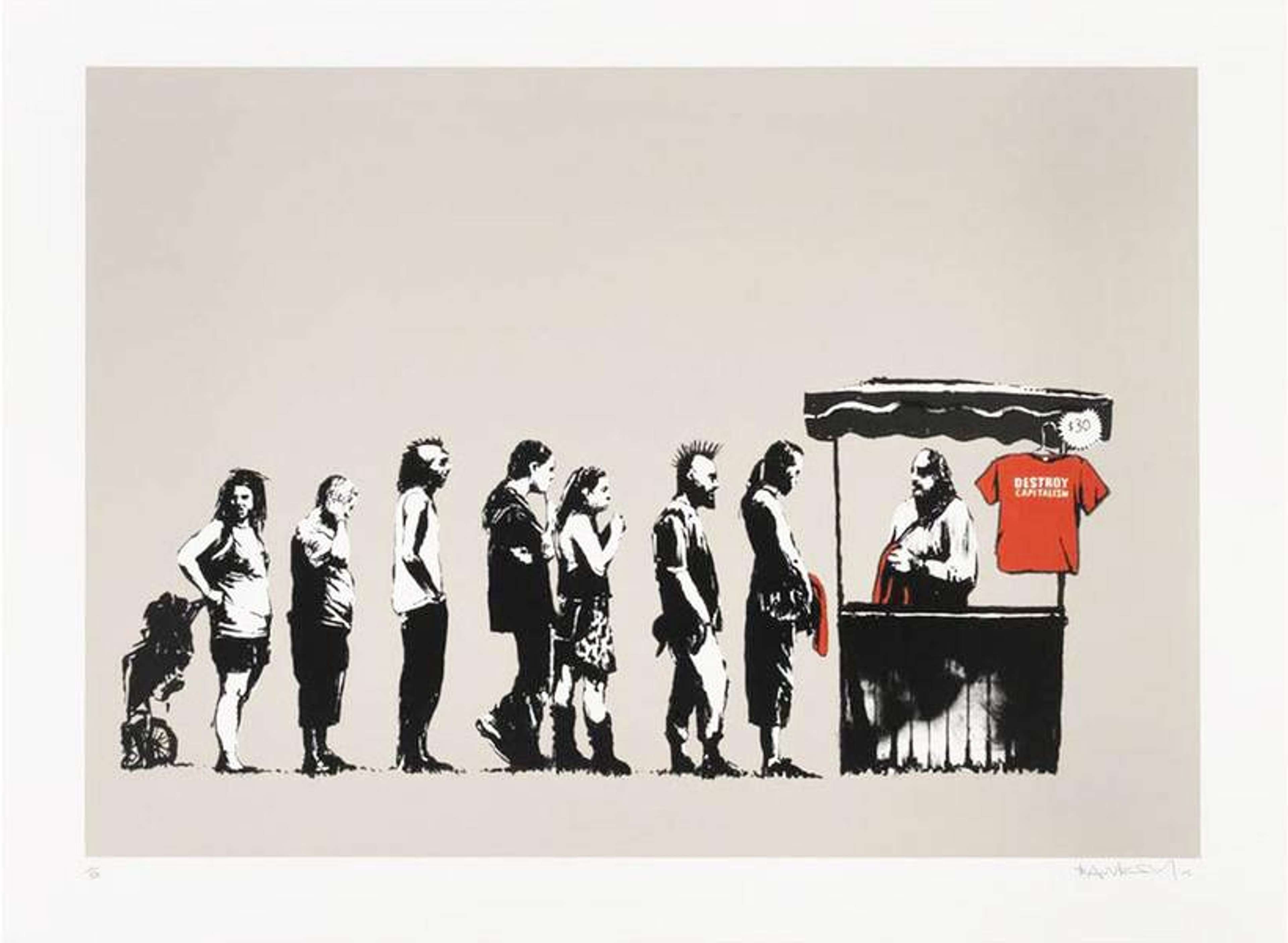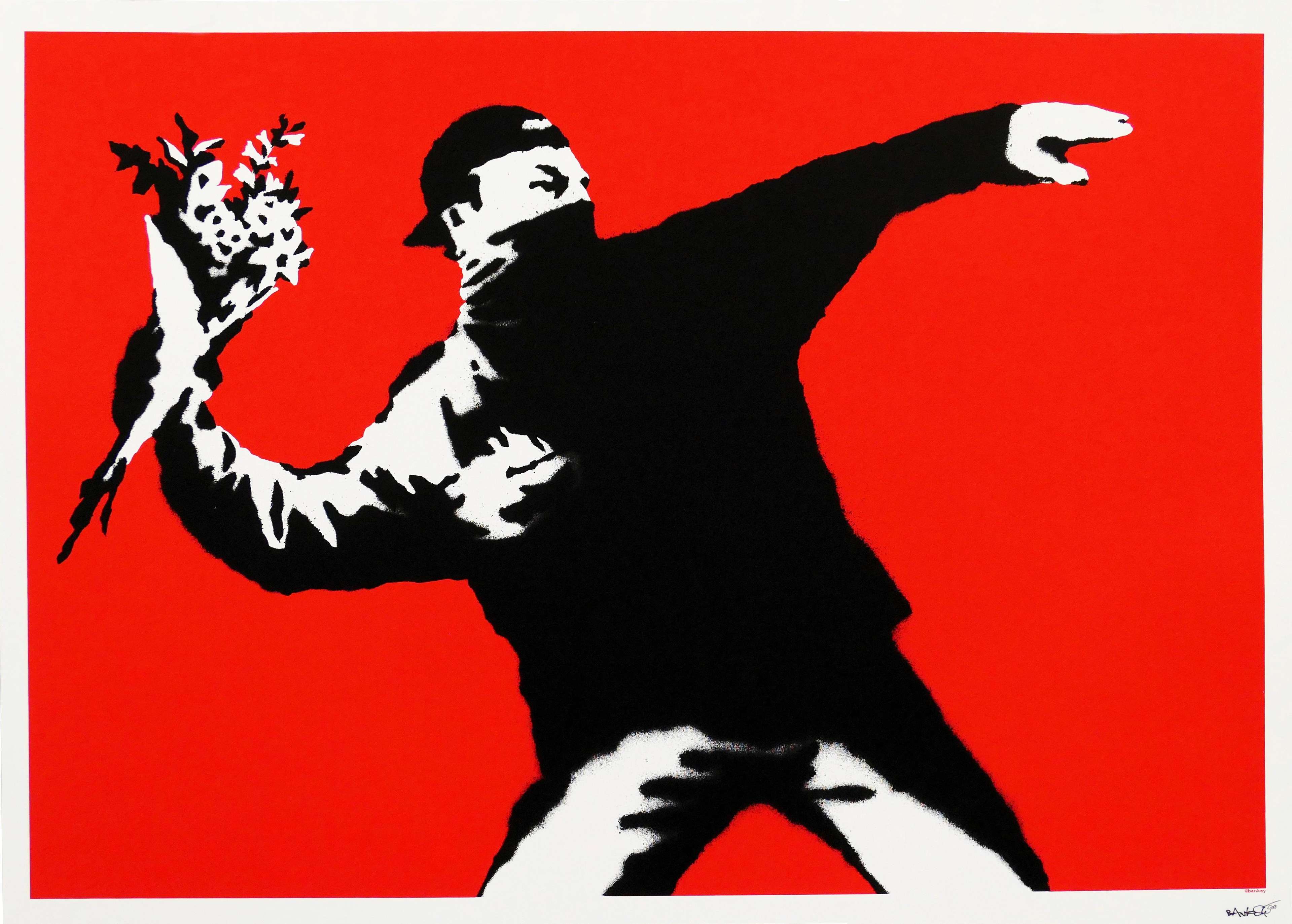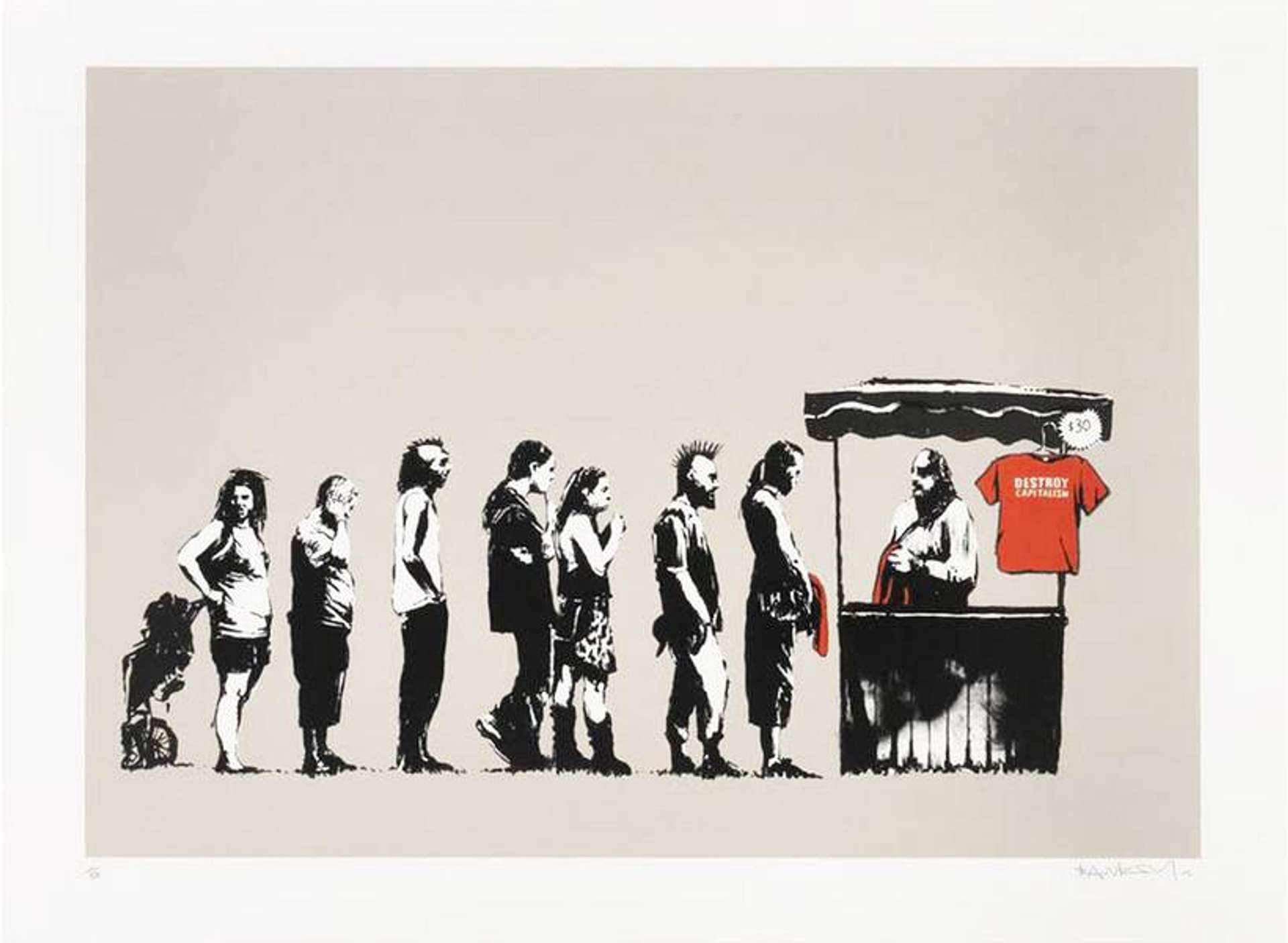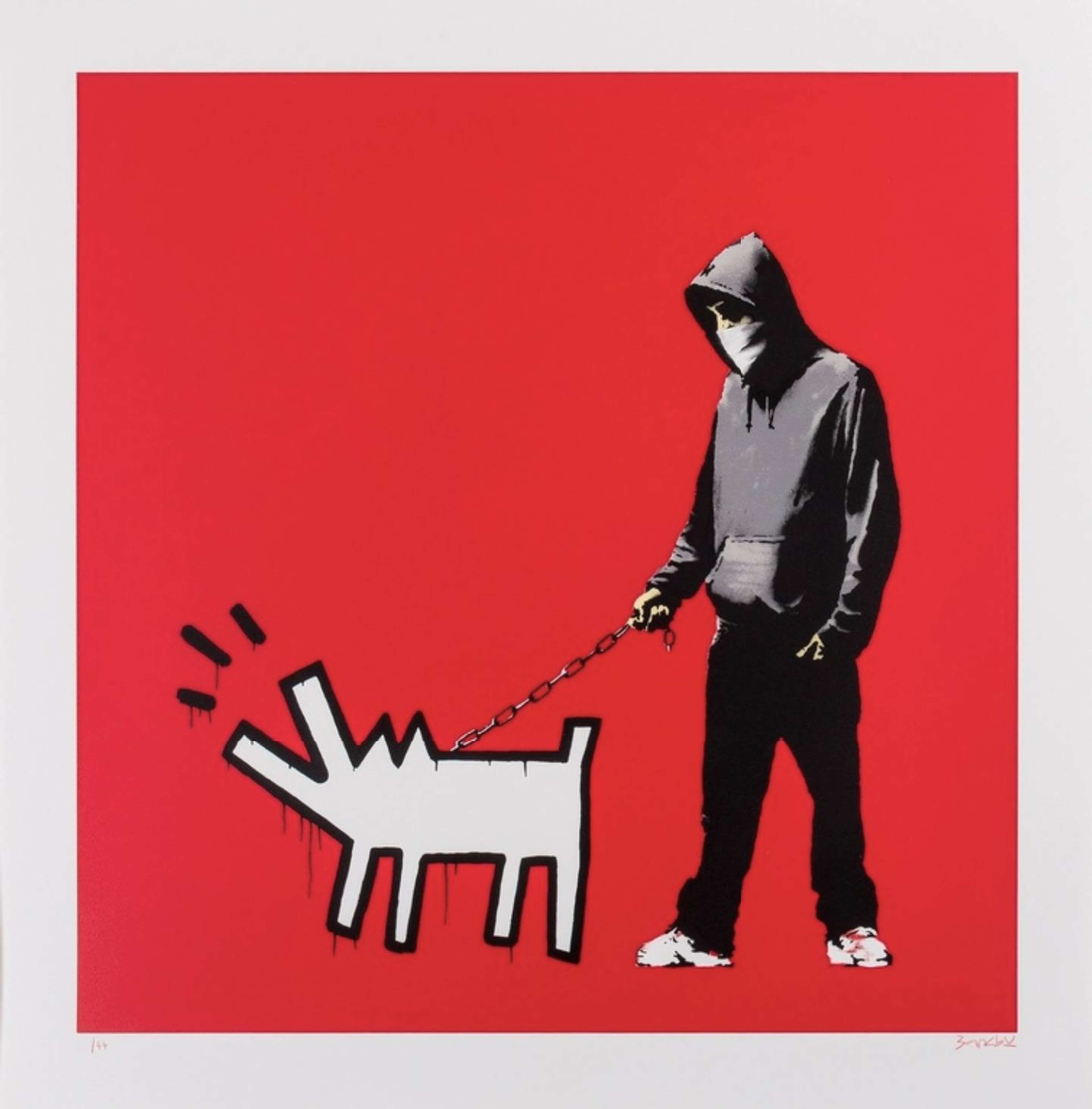 Image © Instagram / Banksy
Image © Instagram / Banksy
Banksy
270 works
On the 18th November 2022, Guess were forced to shut their Regent Street doors after Banksy incited shoplifters to loot the store. In his third Instagram post of the year, the elusive street artist declared: "They've helped themselves to my artwork without asking, how can it be wrong for you to do the same to their clothes?"
This isn't the first spat between Banksy and a big brand, and it certainly won't be the last. However the question remains: who is in the right?
In November 2022, Guess announced their collaboration with Brandalised. The image licensee had supposedly secured "the rights to The World's Most Famous Graffiti in support of a global fan culture". Despite their claims to make street art more accessible, Brandalised's 'licensing' rarely involves consulting the artists' involved for permission.
It should come as no surprise, then, that Banksy was outraged to see his works plastered over a campaign titled "Guess X Brandalised With Graffiti by Banksy".
 Image © Guess / Graffiti Print T-Shirt © Guess 2022
Image © Guess / Graffiti Print T-Shirt © Guess 2022It would seem that Guess found no fault with their unauthorised use of Banksy's work. Paul Marciano, the chief creative officer at Guess, praised Banksy's influence on pop culture during the launch of the collection. Guess were supposedly so indebted to Banksy that they declared, "the new capsule collection with Brandalised is a way for fashion to show its gratitude". Indeed, this is an interesting show of gratitude seeing as the artist had no input whatsoever, nor will he receive any profits from Guess' sales.
T-shirts and sweatshirts from the collection are adorned with Banksy's graffiti, selling in the range of £35-£55. Perhaps the ultimate insult to Banksy was their appropriation of his moniker, with the name 'Guess' printed in Banksy's distinctive style.
A Rejection of Capitalism?
If you asked Banksy, he'd probably say that he's never pandered to capitalism. Back in the early days of his career, Banksy and his former-agent Steve Lazarides would sell cheap original prints out the back of Lazarides' car. As an anonymous street artist, Banksy has always evaded the snobbery of the art world and - apparently - the almighty wealth that comes with it.
Banksy has never made works or products for the commercial market either. His authentication company, Pest Control, have stated: "Banksy doesn't do merchandise. So weirdly, if something looks like a 'Banksy product' it almost certainly isn't." It couldn't be clearer for big brands that Banksy doesn't respond well to the misuse of his work, though this clearly didn't faze Guess.
The Issue of Anonymity
The Guess fiasco is not Banksy's first run-in with copyright feuds. Back in 2021, he lost a legal battle with a greeting card company, Full Colour Black, who used his Love Is In The Air (Flower Thrower) without permission. The spat resurfaced a longstanding trademark dispute over his name and artwork. However, Banksy's pleas proved futile, as the European Union's Intellectual Property Office (EUIPO) ruled against Banksy in May 2021. According to the EUIPO ruling, Banksy cannot expect to claim rights over his work while he remains anonymous and cannot be identified.
Just last week, this ruling was overturned. Banksy and the Pest Control team were finally victorious against Full Colour Black. The new ruling concluded that Banksy's trademark over his imagery is in fact valid, despite his anonymity. Perhaps this tremendous win for the Banksy team incited his response to the Guess campaign.
Banksy's anonymity has long protected him from both public scrutiny and the potentially corrupting force of fame. Ironically, his anonymity has also contributed to his success, as his entire persona is shrouded in mystery. After last week's U-turn in court, it would seem his true identity isn't so relevant to his trademark entitlements after all. So, don't expect Banksy to come clean about his identity any time soon.
"Copyright is for Losers"
In his 2005 book Wall and Piece, Banksy famously claimed: "Copyright is for losers". The statement is, perhaps, one of Banksy's biggest regrets as it has been used time and time again to challenge the ownership of his own work. Whenever a trademark issue hits the press, this is the slogan that journalists chant like a broken record. However, as Pest Control have asserted: "Saying 'Banksy wrote copyright is for losers in his book' doesn’t give you free rein to misrepresent the artist and commit fraud. We checked."
In the past five years, legal developments suggest Banksy is reclaiming control over his creations. In 2019, the UK greeting card company Full Colour Black challenged Banksy’s trademark over his Love Is In The Air work, arguing the registration was made in bad faith and lacked distinctiveness. Initially, the EU’s Intellectual Property Office sided with Full Colour Black in 2021, citing Banksy’s anti-copyright statements and the public accessibility of his art. However, in late 2022, the EUIPO reversed this decision, ruling there was no evidence of dishonest behavior by Pest Control, Banksy’s authentication body, and reaffirmed the trademark's validity. This marks a significant victory for Banksy, allowing him to protect his work under both copyright and trademark law, despite his anonymity.
Though Guess have since boarded their windows and closed their doors on Regent Street, we're still talking about the entanglement. As one comment on Banksy's brazen post read: "This is the most publicity they've had since 1993". This comment is just one of 22,100, and counting. It would seem that the fashion label didn't learn their lesson, as just months later another lawsuit was brought against Guess by two other street artists for alleged copyright infringements. Danish artist Robin Ronn (aka Bates) and Patrick Griffen, brother to the late Sean Griffin (aka Nekst), filed their lawsuit accusing Guess of using their tags without permission in February 2024. The result of Banksy's lawsuit is yet to be announced.
Banksy's open call to shoplifters caught the attention of the world, as everything Banksy does. For either party involved, the entire debacle has made one thing certain: any press is good press.
 Image © Pest Control
Image © Pest Control








